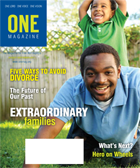
August-
September 2011
Extraordinary
Families
E-Reader
About ONE
----------------------
|

Jesus never makes poverty either a means of grace or a test of obedience.
Is More Really Better?
by Brenda Evans
Datchie saw blue smoke, she said, the worst color you can see unless you’re longing to die. At 88 and in weakened health, Datchie was ready. Blue smoke, to her, was the opaque veil between this life and the next, and she was eager for the next.
Besides her blue smoke, a small home, chocolate drop cookies, handmade quilts, and a beige trash can with a $20 bill scotch-taped to the bottom, Datchie had very little except good friends and a daughter who loved her. Though she flirted with poverty every day, Datchie lived a rich life. She was not destitute, just money poor. The $20 was her only “stash” of cash and her monthly income check was tiny, but she had friends and joy and no genuine needs.
Datchie taught me that wealth and poverty are slippery words, hard to get a firm grasp on. Proverb writer Agur must also have found them tricky because he asked God to give him “neither poverty nor riches.” Poverty might turn him to thievery, he reasoned. Riches could lead to apostasy (Proverbs 30:8-9).
Of course, deep poverty is easier for us to grasp. It is utter destitution, a life-threatening powerlessness to provide food and shelter for oneself or family. Late in World War II in Cerignola, Italy, hungry residents had no meat, salt, sugar, or milk and only small rations of wheat flour. Once the hard wheat cradle of Italy, Cerignola was slowly starving.
So when a nearby Army Air Force squadron, Yanks, as the Italians called them, brought a truck load of Spam, dried eggs, milk, and white bread, one man declared that the Americans had brought “richness” to their town. The truth is, the airmen gave the food because they were tired of dried eggs and Spam, neither of which seemed like “richness” to them.
Christians go back and forth between opinions on poverty and wealth as well. Many idealize poverty, at least austere frugality, and claim that the pursuit of wealth is a deadly trap from which no good Christian can escape. John Wesley and Randy Alcorn, for example, preach that we should give away all except what is needed for barebones living.
Most of us say we fall somewhere between the extremes of hot-footed pursuit of riches and godly self-restraint, yet mostly we get all we can and spend all we earn. The philosophical middle ground or what the Greeks called the Golden Mean isn’t what most of us practice when it comes to money. So what should our attitude be?
Jesus, at first glance, seems to come down on the side of poverty. To the Rich Young Ruler He said, “Sell all you have and distribute to the poor...and come, follow me (Luke 18:22). Yet, He said nothing like that to the well-to-do women who provided for Him and His disciples (Luke 8:3).
Nor did He pressure the wealthy Zacchaeus to sell all and give to the poor. He let Zacchaeus decide for himself. Why didn’t He poke His finger in the short man’s face? Because, as F. F. Bruce says in The Hard Sayings of Jesus, Jesus never makes poverty either a means of grace or a test of obedience.
If Jesus didn’t idealize the spiritual benefit of poverty, neither should we. For those Christians who call poverty a discipline of abstinence or simplicity, Dallas Willard in The Spirit of the Disciplines says, “No.” Genuine poverty is not about either abstinence or simplicity. It is about “crushing deprivation and helplessness,” and is simple only in the sense that it puts a person “in a straightjacket tied to a tree” and leaves him “torn and fragmented” by multiplied hardships of life.
If Jesus doesn’t call poverty spiritual, does He call wealth evil? Again, no. It is Christians who have prejudice against wealth, Dallas Willard says. Admittedly, Jesus warns His followers: “How hard it is for those who have riches to enter the kingdom of God” (Luke 18:24). And in the parable of the sower, He cautions that “the cares of this world and the deceitfulness of riches choke the word” (Matthew 13: 22).
But Paul adds perspective on Jesus’ comments about wealth. In 1 Timothy, he addressed the issue twice. First, warning that ambition for riches may lead to destructive lusts and to love of money that destroys and brings “many sorrows” (6:9-10). Yet several lines later he speaks to “those who are rich” and reminds them to avoid haughtiness and not to trust in the uncertainty of wealth. Furthermore, he affirms that God gives us richly all things to enjoy. Then he urges the wealthy to “be rich in good works, ready to give, willing to share” (6:17-19).
Willard says that Paul’s exhortation to the rich has an interesting logic: “If giving is good, having is also good. If giving much is good, having much is also good. If giving more is good, having more is also good.”
And what about Jesus’ commands to help the poor, the weak, the disenfranchised? He says give to the poor, the hungry, any who ask. Invite the destitute, the maimed, the lame, and the blind to our feasts. Give our coats, distribute alms, lend expecting no return. How can we meet those expectations if we ourselves are in near-poverty? As Willard says, “Being poor is one of the poorest ways to help the poor.”
Deuteronomy chapters 29 and 30 are startling in their relevancy on how to view possessions. The Israelites found themselves at Moab, ready to enter the Land of Promise. There, Moses reiterated the covenant at Sinai (Horeb), beginning with “You have seen all that the Lord did before your eyes.... Therefore keep the words of this covenant, and do them, that you may prosper in all that you do” (29:2, 9). Moses’ choice of the word prosper strikes me as both visceral and intellectual. Emotionally, our viscus—an internal organ such as heart, liver, intestines—is stirred by the hope of prosperity. Our longings or sorrows erupt from our hearts, we say.
The ancients’ thought deepest emotions came from the liver or bowels. Either way, Moses’ words stir deep yearnings within us—yearnings for success, prosperity, wealth.
But prosper, as used here, implies more. Exegetes say it is both imperative and conditional: Do consider, do look carefully, become intelligent, prudent, act wisely. Then you will be successful (prosper) in the land I am bringing you into. Can we find a better 21st-century guide to thinking about wealth than that?
American Christians are renowned for financial imprudence, for stupidities. Go back to Deuteronomy 29 and 30. Stand there before the Lord among the hoi polloi. Hear the blessings; hear the cursing (29:14, 15). Then choose, but choose well; cling only to Him, not to prosperity (30:19, 20). Among other things, these passages tell me not to be possessed by my possessions, as Dallas Willard warns.
Jesus commanded the Rich Young Ruler to give his soul away. His command to us is the same, and our triune God is the only one in a position to require that of us. What does that entail? Unreserved commitment to manage our possessions under his double mandate of love God and love our fellowman. Together, those two compel us to manage our wealth to the praise of God and the aid of those in spiritual and physical need.
Willard calls this “the right use of our possessions.” To abandon the goods of this world to the enemies of God is to fail. Godly men and women must assume the responsibility, under God and by His power, he says, of “owning and directing the world’s wealth and goods.”
So, yes, managing more wealth is better. But letting our wealth manage us is not.
About the Writer: Brenda Evans is a retired English teacher. She and her husband Bill (former director of the Free Will Baptist Foundation) live in Cattletsburg, KY. They are proud grandparents of seven.
|
|

